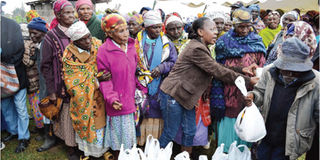Shame of neglect as hundreds of grannies scramble for food

Photo | JOSEPH KANYITO | NATION
Humanitarian worker Joyce Wanjiku distributes food and blankets to elderly people at Mweiga Town in Kieni, last Saturday.
Most of Kenya’s two million elderly people depend on well-wishers to provide food and shelter.
The plight of the frail citizens was brought to the fore at the weekend when 280 of them braved showers and biting cold to queue for hours at Mweiga Town in Kieni to receive blankets and food, with many having walked for miles to receive the help.
The help came from several well-wishers in an event dubbed July Blankets Day for the Elderly.
Dramatic scenes illustrated just how desperately in need these senior citizens are, as they scrambled for the goodies on offer in a rush that belied their age.
Losing consciousness
But the scramble was too much for some, with Mama Leah Wanjiku, 83, from Amboni Village in Kieni, collapsing and losing consciousness due to what her colleagues attributed to hunger.
She was soon revived and given food. She ate two plates, saying, she had not eaten for days.
According to Ms Jane Wambui, an elderly woman from Nyaribo in Nyeri, who had come for aid, some of her colleagues have in the past taken their own lives as their living conditions became too tough for them to cope.
Ms Joyce Wanjiku, a civil society worker with Purity Elderly Care Foundation, said, Mama Leah’s case was synonymous with those of many in the area. The foundation is now looking for means to support the old woman.
“It was a shock to see her collapse after the shoving for food started. She lives with her daughter-in-law who is said to have neglected feeding her.
“Now we are looking for a well-wisher who can be providing her with food as we look for a more lasting solution,” Ms Wanjiku said.
The ones committing suicide may be driven to do so by depression and loneliness, especially when they know that those around them can provide help but are not doing so, she said.
All the provisions given to the elderly were gathered through door-to-door soliciting, with different groups and individuals donating blankets, rice, meat and cereals. Traders at Mweiga Market provided vegetables.
For many of the elderly, it was the first time in days that they were enjoying a hot plate of food, hence the scramble. The elderly also have the extra burden of taking care of orphans who have been left behind by their children.
According to Ms Wanjiku, the old people who have been left to fend for themselves are especially vulnerable in the cold months as their bodies struggle to cope.
She said it is sad when they have to push and shove desperately to access food and warm clothing while those supposed to care for them in their old age live in relative comfort in complete disregard of this problem.
Dr Stanley Kamau of Ahadi Kenya Trust, called on the government to consider rolling out a wider welfare system that can provide for the elderly.
He noted that in other countries, a well-functioning welfare system provides warm clothing and heating for the elderly in the winter months. Nothing prevents the Kenyan government from extending the same to its citizens, Dr Kamau said.
“The government should set up a kitty for elderly people. Each of these people who is not able to cater for his or her needs should be enrolled in the welfare system, because as you can see, they are in need of food, clothes and blankets,” he said.
Dr Kamau said that apart from pointing the finger of blame over the neglect on the government, young people have to play their part as well.
The ageing are especially vulnerable to health problems during the cold season, with a number succumbing to ailments such as pneumonia, arthritis, and rheumatism.
For old and needy people, the cold spell of July and August brings untold misery with many left to fend for themselves as the youth migrate to towns for jobs.




